Features of swamp oak and care for it
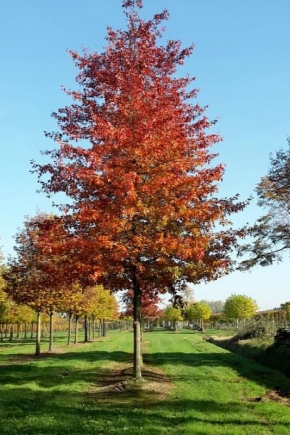
Quercus palustris, which means "swamp oak" in Latin, is a fairly powerful tree. The description of the leaves is replete with different epithets - carved, graceful, saturated with red shades. Its distribution in the Russian climate is due to the interest of summer residents, urban landscaping services. Planting and caring for this tree is simple enough.

Description
The crown of the marsh oak is wide-pyramidal, its diameter reaches 15 meters. The height of the tree reaches 25 meters. Each spring season, the crown is decorated with young shoots of red-brown colors, which hang down until they are strong enough to the degree of young branches. The bark of the entire trunk is distinguished by a smooth surface, until the mature age of the tree does not give the usual cracks. The color of the bark is green-brown. The leaves have a green, glossy shade, they are distinguished by delicate carvings of the edges.
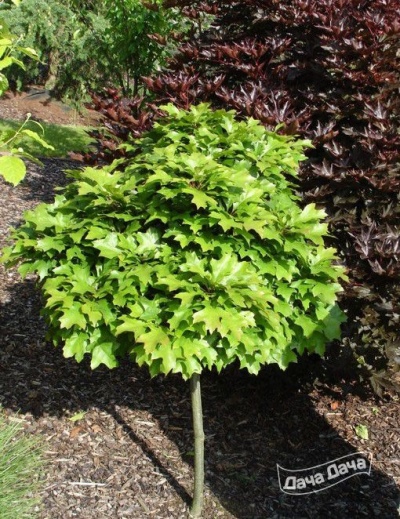
By autumn, the foliage changes color - it becomes bright, red, beautiful tints and tones. The fruits of the oak are traditional - acorns, differing in a spherical shape. They ripen by October-November. The oak has a special, rapid growth, its trunk gets stronger and grows annually until it reaches 1.2-1.5 meters. The oak grows in height by at least 30 cm annually.
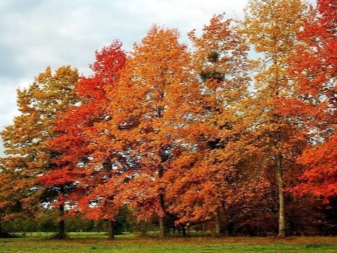
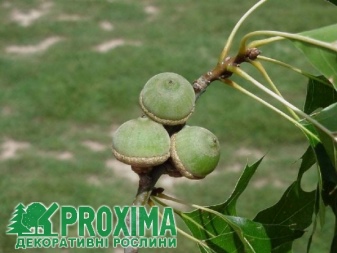
The foliage reaches 12 cm in length, it is decorated with an original carving - 5-7 serrated blades deepened to the center. The color of the leaves is also interesting - their upper side is glossy, pronounced green, the lower side is without gloss, a lighter tone. By autumn, the color of both surfaces becomes bright, purple.

The fruits of the swamp oak are inedible.
Attracted by the coffee color of acorns, their rounded shape, gray cups-caps with a diameter of 1 to 1.5 cm, covering the ripe acorn by almost a third.
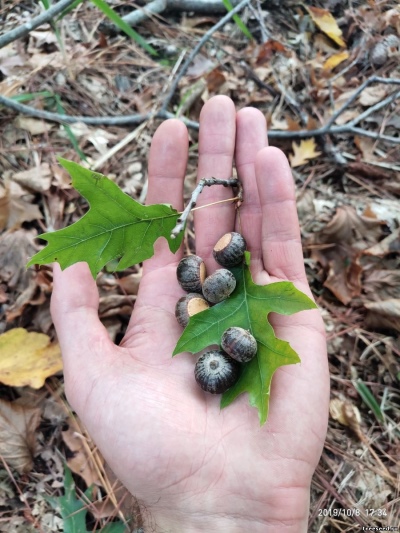
Marsh oak is the most rare species of the oak genus (Quercus), the Beech family (Fagaceae).
It attracts city planners by the absence of allergens and simple care. The tree is easy to sanitize, to give it interesting shapes using special pruning, which has become very popular today in landscaping the streets of large cities and ordinary summer cottages.
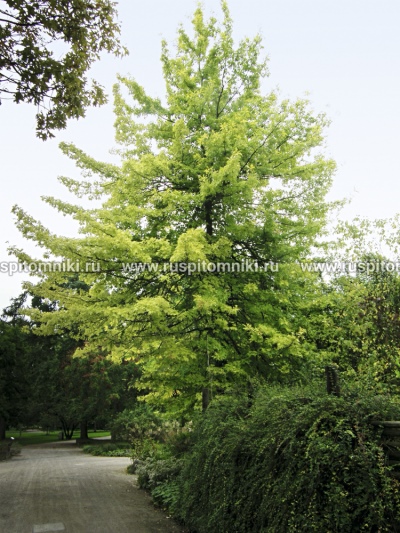
Spreading
The most favorable for Quercus palustris are areas of temperate climate in the Northern Hemisphere, including America, European countries. Here it is often used by landscape designers for group and alley plantings. A beautifully manicured oak looks good in a separate planting, as a pronounced specimen.
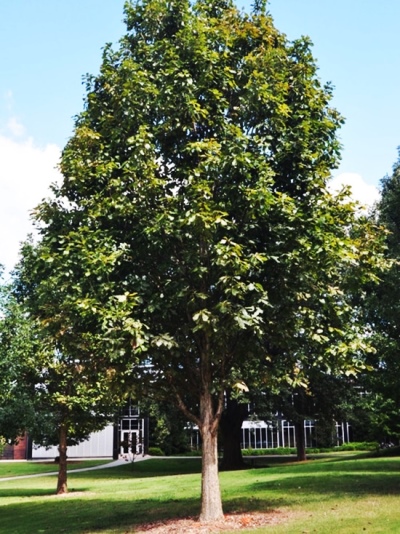
In terms of frost resistance, the plant is classified as a resistant tree that freely tolerates the soil of USDA zone 5.
Oak, despite its frost resistance and love for high humidity, does not take root in St. Petersburg, but it grows well on the Voronezh, Oryol, Tula land, rich in small swamps and lakes.
The plant tolerates frosts worse than its counterparts in the family. He is satisfied with the city space protected from the winds, if the gardeners observe certain conditions.

What swamp oak requires:
- increased attention to the composition of the soil;
- exclusion of alkaline soil;
- sufficient moisture.
This corresponds to the natural living conditions of the tree, where it grows well on the shores of freshwater reservoirs, around wetlands. Quercus palustris takes root well on moderately dry soil, up to moist soil. The main requirement when planting a swamp oak is to take into account that it does not like the high lime content in the soil.
Oak loves sunny space, so trees planted in groups grow slower, not so tall, powerful. Gives a beautiful natural combination in a group with chestnuts, spruces, various conifers and deciduous species.
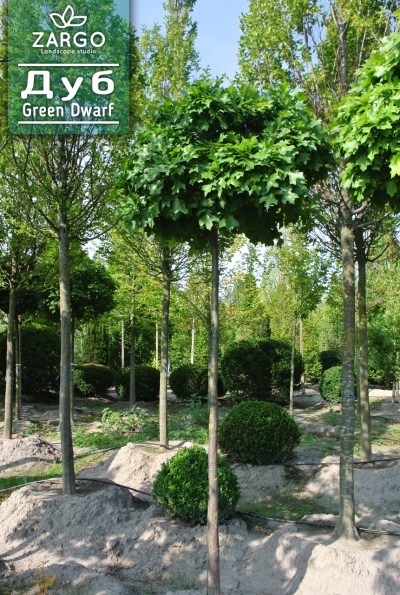
Planting and leaving
Planting marsh oak in garden plots requires compliance with the same conditions - soil composition, soil moisture or constant watering even of mature trees. Freshly planted trees are recommended to be watered daily, 3-4 days. As the seedlings take root and mature, watering is done less often, but it should be regular to maintain approximately the same soil moisture. For mature trees, irrigation is calculated according to the scheme of 12 liters of water per 1 sq. meter of crown.
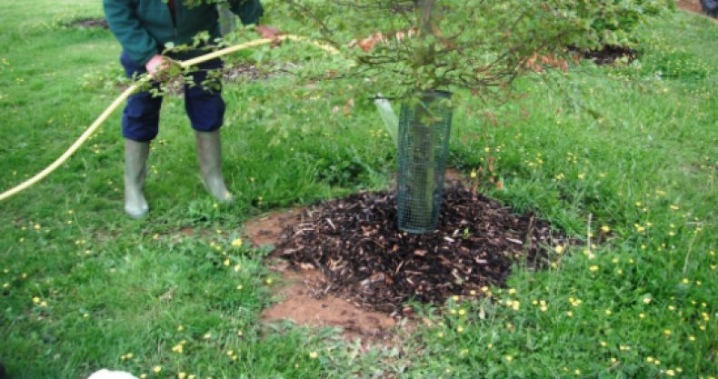
When purchasing seedlings on the market, one must carefully examine them for the presence of powdery mildew damage, necrosis of the trunk, branches. Seedlings can be grown independently, from well-ripened acorns. They must be stored in constantly moist river sand if spring disembarkation is expected. For autumn planting, acorns are sown, after drying them in the air. Barely spring comes, and young seedlings and acorns planted in the fall, as well as adult trees, must be fed with a specially prepared mixture of mullein (1 kg), urea (10 g), ammonium nitrate (20 g) with the expectation of a bucket of water ...
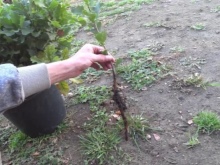
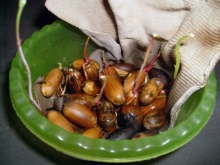
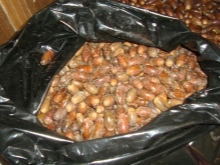
The natural conditions for swamp oak at their summer cottage will need to be constantly recreated and maintained. He needs deeply moistened soil, following the example of river and swampy banks. Then such a tree will become an excellent decoration for the summer cottage, will give the owners a luxurious shade on hot summer days.
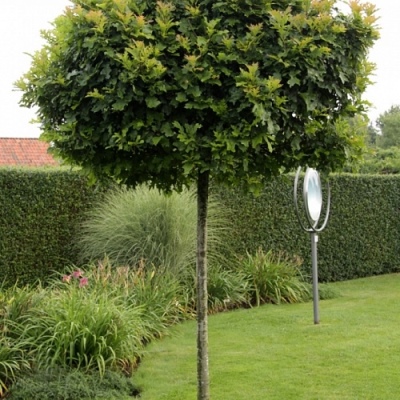



































































The comment was sent successfully.